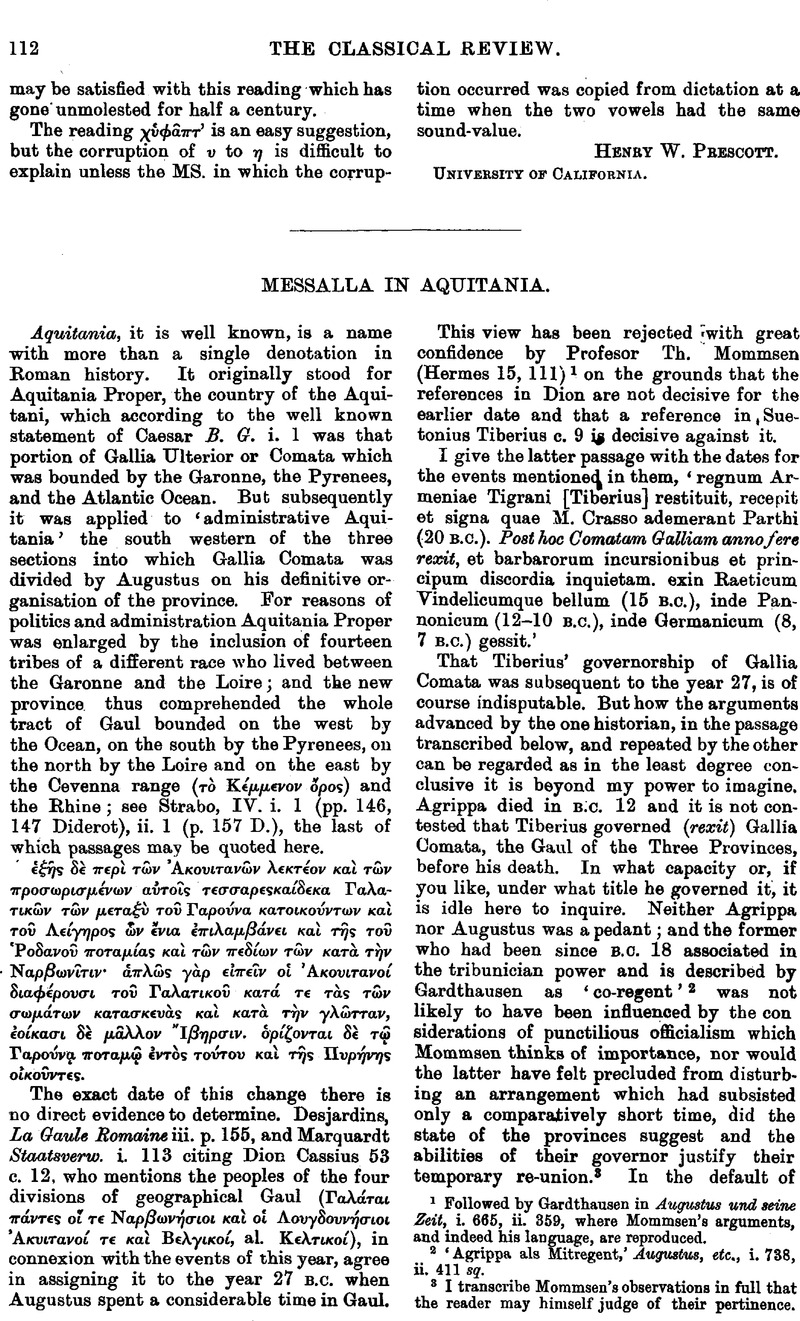Article contents
Messalla in Aquitania
Published online by Cambridge University Press: 27 October 2009
Abstract

- Type
- Original Contributions
- Information
- Copyright
- Copyright © The Classical Association 1903
References
page 112 note 1 Followed by Gardthausen, in Augustus und seine Zeit, i. 665, ii. 359Google Scholar, where Mommsen's arguments, and indeed his language, are reproduced.
page 112 note 2 ‘Agrippa als Mitregent,’ Augustus, etc., i. 738, ii. 411 sq.
page 112 note 3 I transcribe Mommsen's observations in full that the reader may himself judge of their pertinence.
page 113 note 1 Not absolutely certain as testis might have got into v. 10 from v. 11, driving out some such verb as uidit.
page 114 note 1 He might have seen the figures of the conquered streams carried in the triumphal procession: see Prop. 2. 1. 31 sq., Tacitus Annals 2. 41 al.
page 114 note 2 Belling's, H. speculations (Albius Tibullus, Untersuchungeri, p. 205Google Scholar) are rightly condemned by Schanz, M. (Geschichte d. Römischen Litteratur, ii. p. 165) as untenableGoogle Scholar.
page 115 note 1 oratorem) ingenue’ is my correction for the ‘originem’ of the MSS. (Journal of Philology, 28 (1901), p. 159)Google Scholar. Professor Purser has suggested to me since ‘or. unice,’ which would also do. The other emendations proposed are all very improbable.
page 115 note 2 F. Marx in the article ‘Albius’ in Pauly-Wissowa's Real-Encyclopaedie, i. 1322 : ‘T. war gewiss ein tapferer Soldat wenn er nach der Vita von einem Messalla militaribus donis donatus est und zu dem Triumphator die stolzen Worte non sine me est tibi partus honos sprechen durfte.’ A brave soldier possibly, but hardly a modest one.
page 116 note 1 And so, if my view of the Biography is correct, it did not occur to its writer, whose account of what he thought had happened is a very natural inference from the traditional text and the known relations of Tibullus and Messalla.
page 116 note 2 Italics are mine.
page 116 note 3 In the text of his Römische Elegie. He does not give any reasons for the change in his note.
page 116 note 4 No one however has maintained that Tibullus describes Asia as an eyewitness. As we know from I. iii. he fell ill when accompanying Messalla to Asia and was left behind at Corcyra.
page 117 note 1 Mr. Housman (Corpus Tibullus, note ad loc.) has suggested the loss of a pentameter and hexameter between 13 and 14 where there is certainly some corruption in the MS. text. Had Tibullus smooth water on the brain to this extent of selecting this characteristic for two rivers in succession ? I doubt it. The best remedy seems to be to read placidae—aquae and to refer it to the Rhegma as Strabo calls it, the sense being that the ‘blue’ Cydnus flows so peacefully to the sea that its colour alone betrays its passage through the still and shallow lagoon. The ablative would be due to some scribe who understood neither the construction nor the allusion. The heaping up of expressions for the same idea is in itself no proof of corruption ; cf. Tib. ii. 1. 80, ‘placidus leniter,’ Ov. Pont. 4. 10. 54 ‘et tacite peragens lene Melanthus iter,’ Sen. H. F. 580 ‘placida quiete labitur Lethe uado.’ But ‘tacitus undis’ and ‘placidis aquis’ of the same water seems impossible.
- 1
- Cited by




